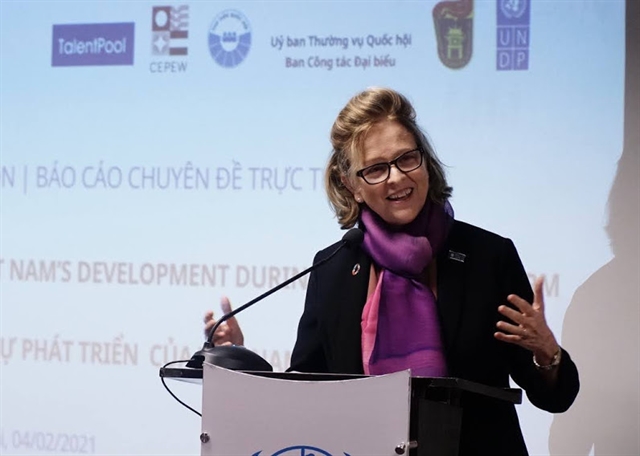 Politics & Law
Politics & Law

Women’s equal representation in leadership and decision-making at all levels, in both public and private sectors, is essential for realising Việt Nam’s socio-economic development vision.

|
| Caitlin Wiesen, the United Nations Development Programme Resident Representative, speaks at the launch of the study entitled “Roles of Women Representatives in Vietnam’s Development during the 2016-2021 Term”. Photo courtesy of the UNDP |
HÀ NỘI — Women’s equal representation in leadership and decision-making at all levels, in both public and private sectors, is essential for realising Việt Nam’s socio-economic development vision.
That's the message from Caitlin Wiesen, the United Nations Development Programme (UNDP) Resident Representative.
She was speaking at the launch of the study entitled “Roles of Women Representatives in Việt Nam’s Development during the 2016-2021 Term” held by the University of Social Sciences and Humanities (USSH) under Việt Nam National University-Hà Nội and the UNDP, with the support from the Australian Government's Department for Foreign Affairs and Trade (DFAT), the Irish Embassy Việt Nam.
The study showed that male National Assembly delegates are more proactive in meeting voters, however , women delegates more frequently engage with voters via social networking applications than male delegates.
In their action plans, women delegates pay more attention to the fields of education and training; health; culture; sport and tourism; ethnicity; labour, invalids, and society; and religion and faith than male delegates. There is no significant difference between women and men delegates in the amount of time they spend on performing their roles and mandates nor in the response rates in handling petitions and proposals from voters during this term.
The study said in terms of value and competence measures, women delegates value ‘having fair and reasonable statements’ and ‘having the ability to persuade others’ more than men delegates.
Voters’ interest in their own constituency is the most important factor influencing both women and men delegates when voicing opinions about a specific issue, it said.
The study recommends creating good conditions for National Assembly delegates of all genders to proactively engage with voters via all channels, making use of social networking channels; and giving women delegates equal representation in all fields by promoting gender parity in all National Assembly committees.
There were two of the key findings that she would like to highlight, Wiesen said.
The first was that women perform equally well as men across all main functions and duties. The other was it was perception and social biases that stand in the way of achieving the Party resolution No. 26 (of 7th Plenum of the 12th Party Central Committee) for women participation in National Assembly and People Council.
“A key recommendation of the study is the importance of ensuring women delegates equal representation in all fields relevant to the public life by increasing women’s delegates participation in all National Assembly committees,” she said.
During the 2016-2021 term, the NA has its first female chairperson and 26.7 percent female representation.
UNDP’s global Human Development Report 2020 ranked Việt Nam 65th out of 162 countries and among the top one-third of countries globally for women’s share of seats in parliament.
According to Professor Phạm Quang Minh, the research team lead, most of the National Assembly delegates interviewed thought that there would come a time when the number of female and male delegates in the National Assembly was equal.
"It is important to join hands to create an enabling environment for female delegates to realise their potential," he said.
Elisa Cavacece, Deputy Head of Mission/Head of Development, the Embassy of Ireland, said Provincial Governance and Public Administration Performance Index (PAPI) has been a powerful tool for the Government of Việt Nam to capture feedback on how policy and public services have been delivered and benefited its citizens.
“The soft launch of the research findings today is a useful platform for the Embassy of Ireland to support and engage, in order to promote gender equality and women’s empowerment. “ she said. — VNS